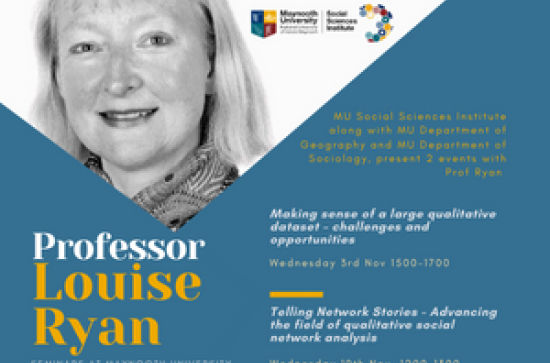
Making sense of a large qualitative dataset – challenges and opportunities - 3rd Of November 15:00 - 17:00 In writing the forthcoming book Social Networks and Migration – relocations, relationships and resources, I have brought together qualitative data generated over 20 years from research projects with migrants of diverse origins and backgrounds. Re-reading and re-analysing all these transcripts during the 2020 lockdowns, I was confronted by the challenge of how to make sense of such a large corpus of data and how to present it to readers in a meaningful and digestible way. I also faced the challenge of how to make sense of change over time. I had interviewed migrants at different moments in time. Moreover, their stories recounted experiences of migration during different decades in history from the 1940s-2010s. Furthermore, some participants had been interviewed on several occasions to track changes in their biographies over time. Using a narrative analysis informed by Ken Plummer (1995) and Margaret Somers (1994) proved to be especially helpful and fitted with my conceptual framework of telling network stories. |
Telling Network Stories - Advancing the field of qualitative social network analysis - 10th Of November 12:00 - 13:00A key aim of the forthcoming book Social Networks and Migration – relocations, relationships and resources, is to advance the field of social network analysis in migration studies. For too long, migration studies have been criticised for applying the term network in a largely metaphorical way. However, at the other end of the spectrum, network analysis has become increasingly quantitative informed by advanced computation and graph theory. In this seminar, I turn to the origins of social network research to consider how qualitative approaches informed by interpretivist perspectives can help to offer more nuanced understandings of relationality in migration experiences and trajectories. Through the framework of ‘telling network stories’ I reflect upon how participants present their relationships, in words and pictures, in the contexts of research encounters. In so doing, I consider what is gained by adopting this approach and what new insights can be generated into how networks are conceptualised and studied. |
Register For Both Dates Here
Biographical statement:
Louise Ryan, a graduate of UCC, is Senior Professor and Director of the Global Diversities and Inequalities research centre at London Metropolitan University. Louise has been publishing on migration for 20 years and edited several books including Gendering Migration (with Wendy Webster, 2008), Migrant Capital (with Umut Erel and Alessio D’Angelo, 2015). Louise has published several highly cited articles in journals such as Sociology, Sociological Review and Journal of Ethnic and Migration Studies. She recently guest edited a special issue of the journal Global Networks (with Janine Dahinden) July, 2021. Louise is currently a co-I on the large Horizon2020 project ‘MIMY’ on migrant youth across ten European countries. In 2015 Louise was awarded a Fellowship of the Academy of Social Sciences for the work on migration.
Professor Ryan is visiting Maynooth University as part of the MUSSI fellowship Scheme and this event is sponsored by MUSSI, MU Department of Geography and MU Department of Sociology.
